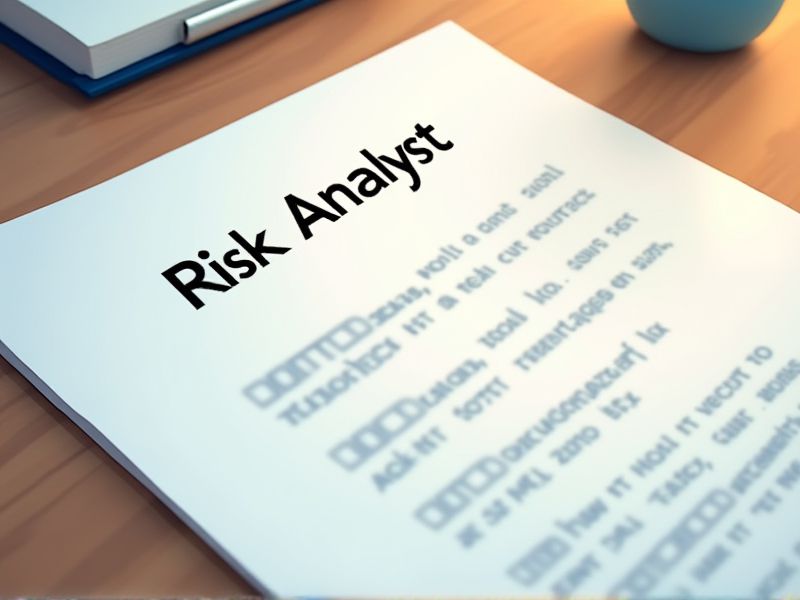
Risk Analysts face complex challenges that require a deep understanding of quantitative analysis and risk management strategies. Certifications equip professionals with the necessary skills to analyze financial risks, develop mitigation strategies, and comply with industry regulations. They enhance credibility and ensure analysts stay updated with the latest methodologies and technologies in risk assessment. Here are some certifications that can enhance your expertise as a Risk Analyst.
Financial Risk Manager (FRM)
Risk Analysts face complex financial landscapes, where an FRM provides specialized knowledge in assessing and mitigating risks. Without an FRM, navigating regulatory requirements and financial instruments becomes challenging. The robust training an FRM undergoes equips them with analytical tools that enhance decision-making. Financial institutions benefit from having FRMs to safeguard against potential losses and improve risk management strategies.
Professional Risk Manager (PRM)
Professional Risk Managers provide a structured framework for a Risk Analyst to identify and assess potential financial uncertainties. By holding the PRM credential, a Risk Analyst gains credibility and recognition in risk management proficiency, enhancing trust from stakeholders. The certification ensures the analyst stays updated on industry standards and methodologies, improving decision-making processes. PRMs offer a comprehensive understanding of interconnected risks, enabling analysts to develop more effective mitigation strategies.
Certified in Risk and Information Systems Control (CRISC)
Certified in Risk and Information Systems Control (CRISC) equips Risk Analysts with a deep understanding of enterprise risk management principles. As cyber threats and regulatory standards grow more complex, CRISC certification enhances analysts' ability to identify and mitigate information system risks. Employers often seek CRISC-certified professionals because their skills align with safeguarding sensitive data and ensuring business continuity. A CRISC credential demonstrates an individual's capability to integrate IT risk management into business processes effectively.
Associate in Risk Management (ARM)
Earning an Associate in Risk Management (ARM) certification provides risk analysts with a comprehensive understanding of risk management principles, enhancing their problem-solving capabilities. This qualification equips them with specialized skills in managing and mitigating potential business risks, which is essential in today's complex risk landscape. Employers often seek risk analysts with ARM certifications as it demonstrates a commitment to industry standards and professional growth. The certification also broadens career opportunities and can lead to higher earning potential by showcasing a proactive approach to risk management expertise.
Certification in Risk Management Assurance (CRMA)
The CRMA certification equips a Risk Analyst with advanced skills in identifying and assessing business risks, which enhances their ability to protect the organization. It signals to employers that the analyst has a deep understanding of governance, risk, and controls, thus positioning them as valuable assets in strategic decision-making. Gaining CRMA certification typically results in greater career opportunities and salary potential due to the specialized expertise it confers. This certification also keeps risk analysts updated with the latest trends and tools in risk management, ensuring they can effectively mitigate evolving threats.
Certified Information Systems Auditor (CISA)
Organizations rely heavily on digital infrastructures, which increases their vulnerability to cyber threats, making a Certified Information Systems Auditor (CISA)'s expertise in identifying and mitigating risks critical for a Risk Analyst. The CISA credential equips professionals with a thorough understanding of information system controls and auditing, facilitating the identification of potential weak points within an organization's IT framework. Employers value the CISA certification for its focus on governance, risk management, and compliance, ensuring that Risk Analysts can effectively safeguard business operations. Having a CISA certification helps a Risk Analyst gain credibility, demonstrating their commitment to maintaining the integrity and confidentiality of data.
Certified Fraud Examiner (CFE)
The need for a Certified Fraud Examiner (CFE) in the role of a Risk Analyst arises from the increasing complexities and methods of fraud in business environments. Holding a CFE credential equips a Risk Analyst with specialized knowledge in fraud prevention, detection, and investigation, crucial for proactively identifying potential threats. A deeper understanding of fraudulent activities enhances their ability to craft effective risk mitigation strategies tailored to an organization's vulnerabilities. Employing a Risk Analyst with CFE certification can significantly reduce financial losses associated with undetected fraudulent activities, ultimately safeguarding an organization's assets and reputation.
Project Management Professional (PMP)
Risk analysts face complex projects with many variables; having a PMP enhances their ability to plan systematically. The PMP certification equips them with structured methods that improve risk assessment and mitigation strategies. Achieving a PMP credential often results in better communication skills, essential for coordinating with cross-functional teams. Employers value PMP-certified analysts because their knowledge helps align risk management processes with broader organizational goals.
PMI Risk Management Professional (PMI-RMP)
A PMI Risk Management Professional (PMI-RMP) certification enhances a Risk Analyst's ability to identify and assess risks comprehensively. The certification provides structured methodologies and tools, leading to better risk mitigation strategies. Knowledge gained from the PMI-RMP offers a competitive advantage in project management environments that prioritize risk management. Organizations benefit from reduced project uncertainties and improved decision-making when employing PMI-RMP certified analysts.
Certificate in Quantitative Finance (CQF)
Possessing a Certificate in Quantitative Finance (CQF) enhances a Risk Analyst's ability to model financial risks accurately, which is crucial in identifying potential threats to assets. The CQF program imparts knowledge in advanced quantitative techniques and financial theories, enabling better prediction and management of uncertainties. Employers often seek analysts with a CQF certification due to its rigorous training in computational finance and risk management, marking it as a testament to the holder's expertise. Risk Analysts equipped with CQF certification are more adept at adapting to rapidly evolving market conditions, benefiting organizations through informed decision-making.
Summary
As a reader pursuing certifications, you enhance your credibility and marketability in the field of risk management. Earning such certifications often leads to better job opportunities and potentially higher salaries. Employers tend to view certified professionals as more knowledgeable and reliable, making you a valuable asset. Increased competency from certification can improve decision-making and risk mitigation strategies.
